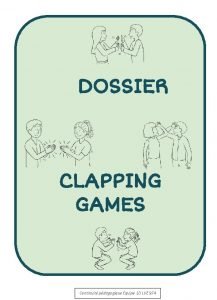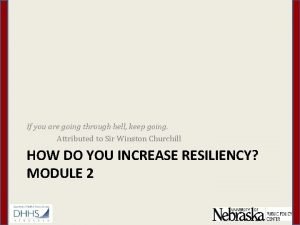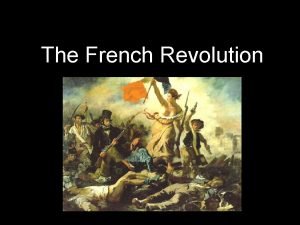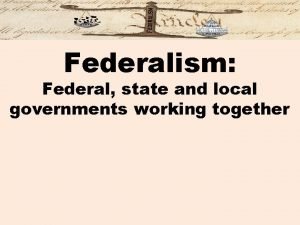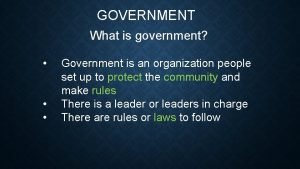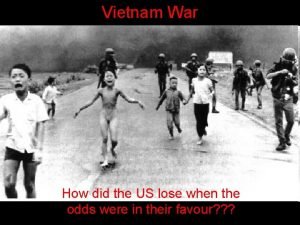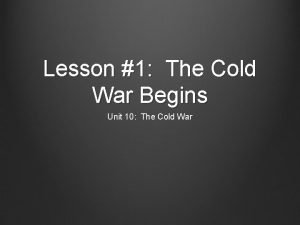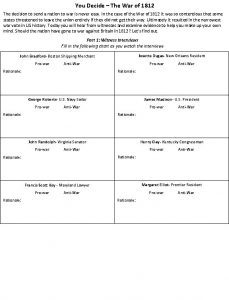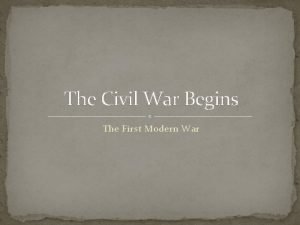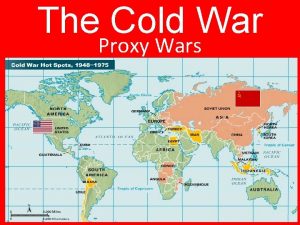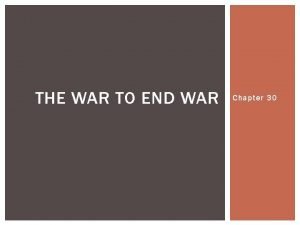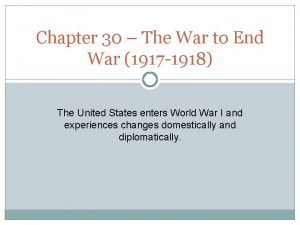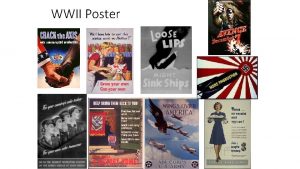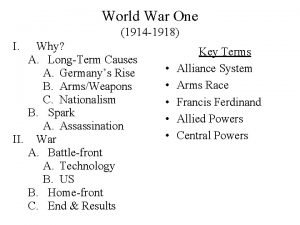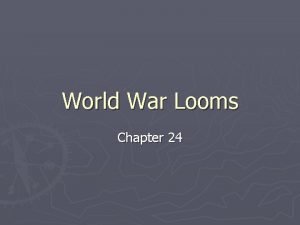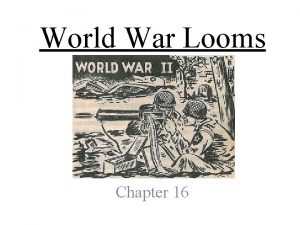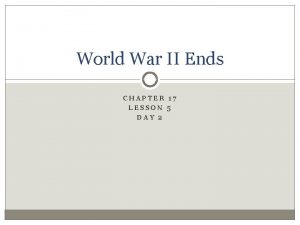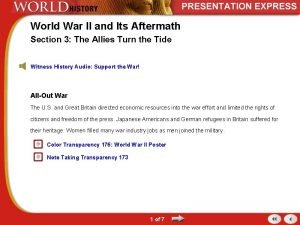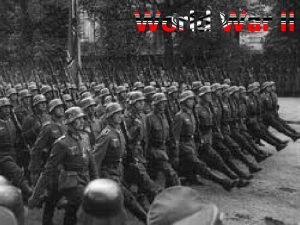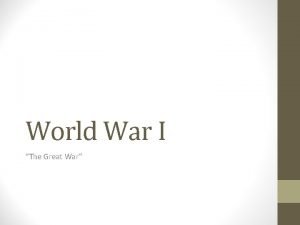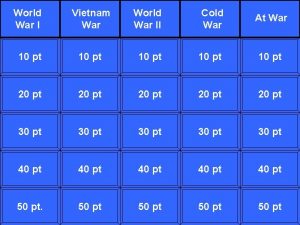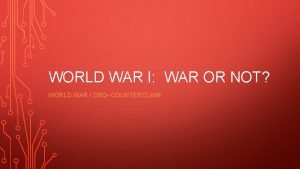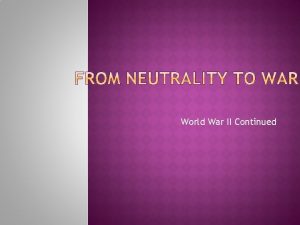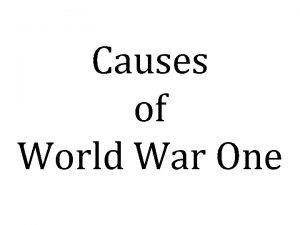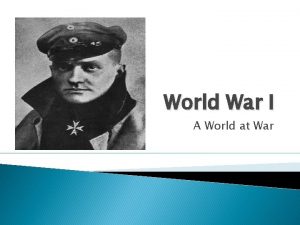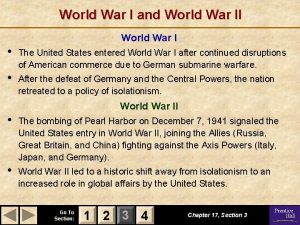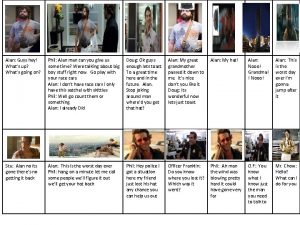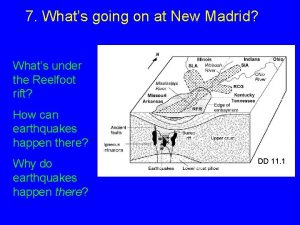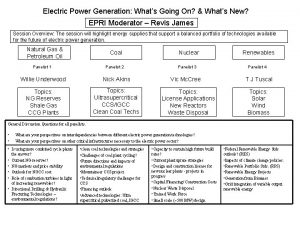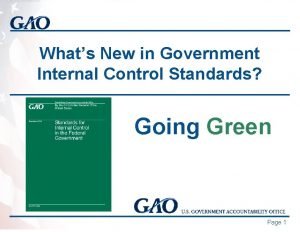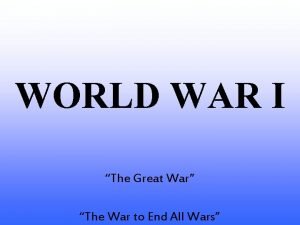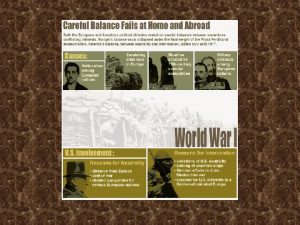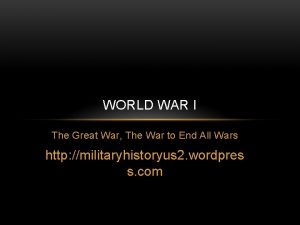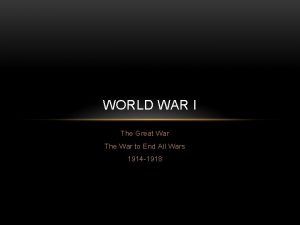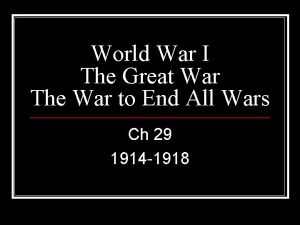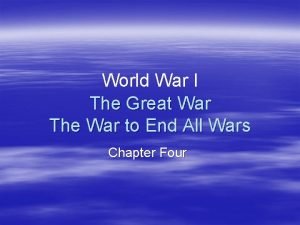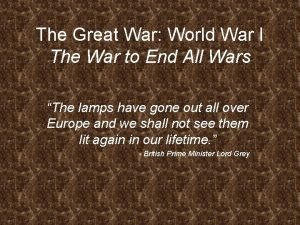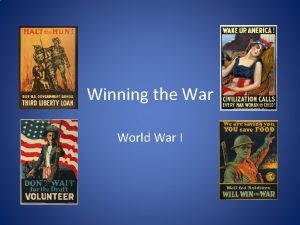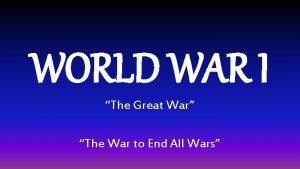World War II Whats going on with government





























- Slides: 29

World War II

What’s going on with government in Europe after WWI? The Rise of Fascism What is Fascism? ?

The Rise Of Facism • Characteristics of Fascism • In a nutshell… Fascism – glorifies war, preaches an extreme of nationalism, follow the command of a dictator

Fascism in Italy • The Fascist party of Benito Mussolini gains power in 1922. Anyone that criticizes Mussolini is severely punished!!!

Fasicm in Germany • Germany was feeling the effects of the Treaty of Versailles. – Do you remember what Germany had to do according to the treaty? • Pay reparations • Give France a coal mine for 15 years

• Not only was the economy of Germany hurt so was…? ? ? – Germany Nationalism Who do you think is going to restore the state of Germany? • Many embittered Germans found an outlet in the emotional speeches of Hitler, the leader of the Nazi Fascist Party. • Hitler turned the rage and frustration of the Germans against the Jews • In 1933 Hitler seizes absolute power of Germany

A Quick Refresher in U. S. Foreign Policy • Isolationism – Non-involvement • Neutrality – Not taking sides in a foreign war

Disillusion and Pacifism • Before WWI, U. S. Foreign Policy Isolationism • Until what happens? German U-Boats attack the Lusitania • During WWI, U. S. Foreign Policy Involvement and Internationalism (Wilson leading the Paris Peace Conference) • Back to Isolationism after WWI • How did pacifist feel about going to war or supporting warring nations?

What are the historical roots of Neutrality and Isolationism? • George Washington – Farewell Address • Monroe Doctrine – 1) The United States would not get involved in European affairs. – 2) The United States would not interfere with existing European colonies in the Western Hemisphere. – 3) No other nation could form a new colony in the Western Hemisphere. – 4) If a European nation tried to control or interfere with a nation in the Western Hemisphere, the United States would view it as a hostile act against this nation.

How do you think the U. S. is going to react to the rise of Fascism in Europe • The Neutrality Acts … – No sale or shipment of arms to warring nations – No loans or credits to warring nations – No traveling of U. S. Citizens on ships of warring nations (what event do you think this is built upon? ) – Nonmilitary goods bought by warring nations are to be paid in cash and transported on their own ship (Cash and Carry Principle)

Aggression in Europe • Who are three aggressors of Europe? 1930’s were a time of depression in the U. S. and Aggression in Europe. Though Germany and Japan are threats to world peace, America is determined to stay neutral and not involved!

Hitler’s actions!! • Violates the Treaty of Versailles by

Japan’s Actions

Italy’s Actions • Mussolini adopts a policy of military expansion. He ordered his army to bring glory to the fascists cause by conquering territory in Africa. The African kingdom of Ethiopa put forth a valiant effort but fell to the Italians.

Britain Responds to the Agression

Britain Responds to the Agression E: A - Global 10 R 2006 - 2007Rise of Totalitarian Government & WWIIAppeasement Cartoon. pdf

Great Britain and France declare War!!!! • Germany invaded Poland in September of 1939. This time, instead of continuing to appease Hitler, Great Britain and France declare war on Germany. World War II has officially begun.

The War in Europe!! During the first two years… • The democracies (G. B. , France and Allies), suffer a series of crushing defeats. Slamming across the polish border, wave after wave of German tanks and planes forced Poland to surrender within only 30 days.

• So overwhelming was the German method of attack that it was called Blitzkrieg ( a German word meaning Lightning War). • Next, Germany took Norway and Denmark, France managed a brief resistance but soon fell.

• Just before the war, Stalin (Soviet Union) signed a nonaggression pact with Germany. What do you think this means? • Neither Germany nor the Soviet Union would attack each other, Neither friend nor foe.

The Challenge for Great Britain • With France beaten and the Soviet Union not involved, it was up to Great Britain to stop the Germans and its Italian allies from quickly conquering Europe. • Hitler planned to invade England in September of 1940. To weaken its enemy first, Hitler ordered thousand of German planes to bomb England. • Nightly, British air raid sirens warned civilians of German attacks. The Royal Air Force shot down enough planes to call off the attack. Even so…Great Britain would struggle for months as the last foe to resist Nazism!!!!!!

What was the U. S. foreign policy at the time? Did the U. S. keep this foreign policy for long?

Gradual U. S. Involvement • The outbreak of war and the German drive caused a sharp turnaround in U. S. public opinion. • More of the U. S. change its willingness to help Britain because if Germany succeeded it would be a threat to U. S. security. So what do you think…does the U. S. go right into war? ?

In order to help the British, the United States changes its Neutrality Acts and creates the Destroyer Deal and the Lend Lease Act

The Neutrality Act of 1939 • The Neutrality Act of 1939: – According to the original law, only nonmilitary goods could be shipped to warring nation on a cash and carry principle and military supplies could not be sold at all. – Under the new law, U. S. made war supplies could be sold to warring nations if they paid in cash and carried in their own ships.

Destroyer Deal (A. K. A. Destroyer- for-bases deal) • To help the British defend themselves against German sub attacks, President Roosevelt agreed to transfer to Britain 50 U. S. Destroyers. In exchange, the U. S. will be given eight British Naval and Air bases

Lend Lease • The Lend-Lease Act of March 11, 1941, was the principal means for providing U. S. military aid to foreign nations during World War II. • The act authorized the president to transfer arms or any other defense materials for which Congress appropriated money to "the government of any country whose defense the President deems vital to the defense of the United States. " • Britain, the Soviet Union, China, Brazil, and many other countries received weapons under this law. • Lend-Lease brought the United States one step closer to entry into the war


• Roosevelt meets with Winston Churchill (Prime Minister of England) to discuss common wartime aims known as the Atlantic Charter. Some of these common aims included: – Recognizing of the right of all nations to selfdetermination (the right for people to choose their government) – U. S. -British understanding that neither power would seek to gain territory from the war. – The disarmament of aggressive nation – A “permanent system of general security” for the future
 Tic tac toe going high going low going criss cross lollipop
Tic tac toe going high going low going criss cross lollipop Going through hell
Going through hell Whats going on in
Whats going on in What is in this picture
What is in this picture Tell me whats really going on
Tell me whats really going on Tell me whats really going on
Tell me whats really going on National powers
National powers Five friends decided on going to world destination
Five friends decided on going to world destination What is a republic
What is a republic James madison war at home
James madison war at home Description
Description The cold war lesson 1
The cold war lesson 1 Presidential and radical reconstruction venn diagram
Presidential and radical reconstruction venn diagram Josette dugas
Josette dugas Ich war du
Ich war du Tug of war or tug-of-war
Tug of war or tug-of-war Why was the civil war the first modern war
Why was the civil war the first modern war Already simple past
Already simple past Toward civil war lesson 3 secession and war
Toward civil war lesson 3 secession and war Proxy wars in cold war
Proxy wars in cold war Chapter 30 the war to end war
Chapter 30 the war to end war Chapter 30 the war to end war
Chapter 30 the war to end war Whats hot whats not
Whats hot whats not Which persuasive technique is used in this poster
Which persuasive technique is used in this poster Results of the world war 1
Results of the world war 1 Chapter 24 world war looms
Chapter 24 world war looms Chapter 16 building vocabulary world war looms
Chapter 16 building vocabulary world war looms Lesson 5 world war ii ends
Lesson 5 world war ii ends World war 2 and its aftermath section 3 quiz
World war 2 and its aftermath section 3 quiz Brainpop
Brainpop
